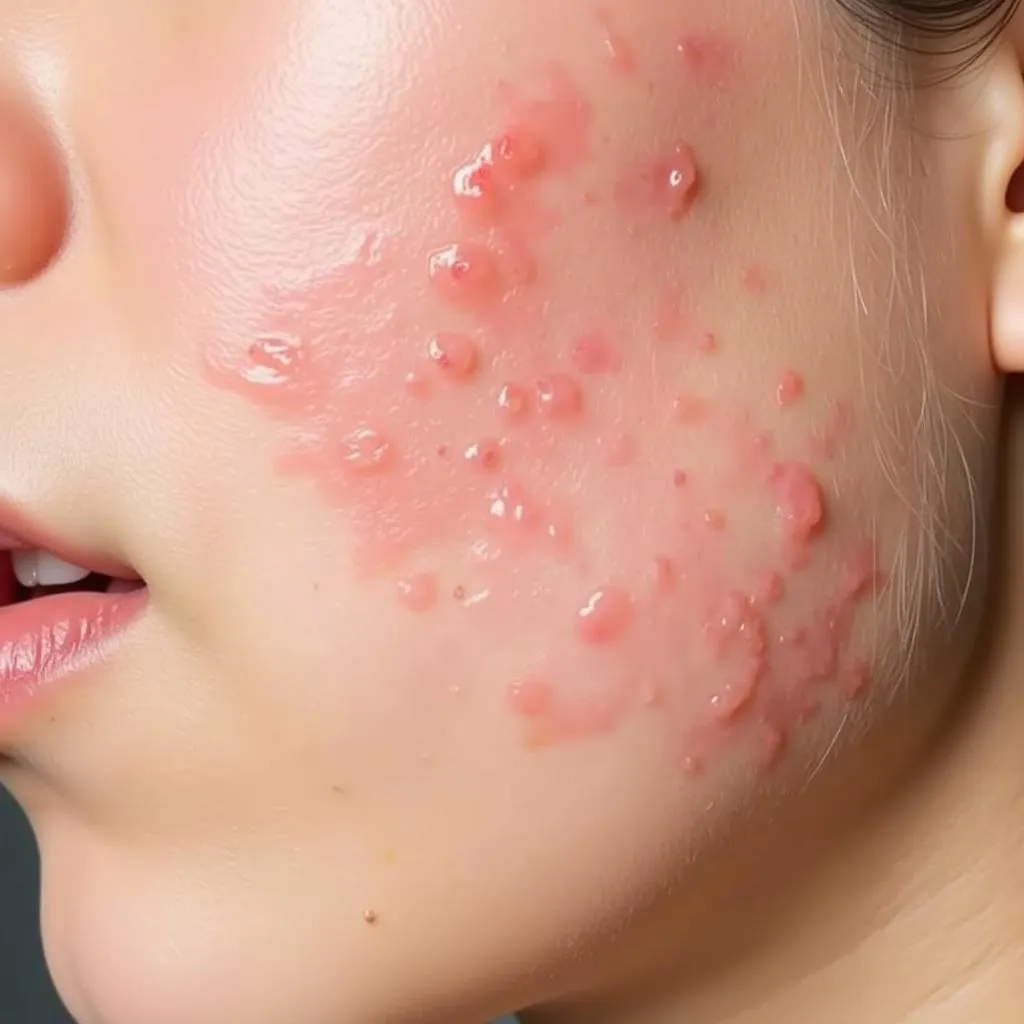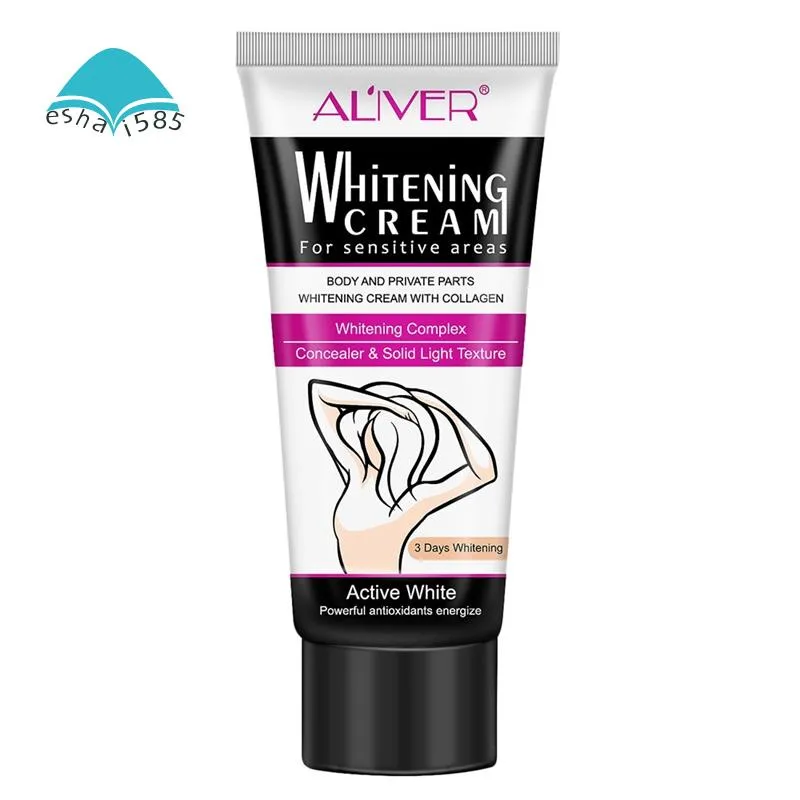Understanding Aliver Whitening Cream
Aliver Whitening Cream has gained popularity as a solution for individuals seeking to lighten their skin tone, reduce dark spots, and achieve a brighter complexion. This article delves into the intricacies of Aliver Whitening Cream, exploring its ingredients, the science behind its effects, and, crucially, the potential side effects associated with its use. The goal is to provide comprehensive information, empowering consumers to make informed decisions regarding their skincare routine. Understanding the benefits and risks is essential before integrating any new product into your regimen. This includes knowing the active compounds, how they interact with your skin, and the precautions necessary to ensure safety and effectiveness. This will help you navigate the world of skin whitening with confidence.
What is Aliver Whitening Cream?
Aliver Whitening Cream is a topical skincare product marketed to lighten the skin. It typically contains various ingredients designed to reduce the production of melanin, the pigment responsible for skin color. The cream aims to diminish the appearance of dark spots, hyperpigmentation, and uneven skin tone, leading to a more uniform and brighter complexion. The effectiveness of the cream depends on the specific formulation, the concentration of active ingredients, and individual skin characteristics. Many users are drawn to these products due to the promise of a more radiant and youthful appearance. However, it is essential to understand that the effectiveness can vary widely depending on the user and that the potential risks should always be carefully considered.
Ingredients of Aliver Whitening Cream

The composition of Aliver Whitening Cream can vary, but it often includes key ingredients known for their skin-lightening properties. Common components may include hydroquinone, a potent skin-lightening agent that inhibits melanin production; kojic acid, derived from fungi, which also helps to lighten skin and reduce dark spots; vitamin C, an antioxidant that can brighten skin and protect against environmental damage; and various plant extracts, such as licorice extract, known for its anti-inflammatory and skin-lightening effects. The specific combination and concentration of these ingredients determine the cream’s overall efficacy and the potential for side effects. Always review the product label carefully to understand the ingredients present and to identify any potential allergens or irritants. It’s also important to note the absence of specific ingredients like parabens or sulfates that can have an impact on your skin.
The Science Behind Skin Whitening
Skin whitening products work by targeting melanin production, the pigment that gives skin its color. The primary mechanism involves inhibiting tyrosinase, an enzyme crucial for melanin synthesis. Ingredients like hydroquinone and kojic acid achieve this by disrupting the process. Vitamin C acts as an antioxidant, protecting against free radicals that can trigger melanin production and also helps in brightening the skin. The effectiveness of these products can vary based on the concentration of active ingredients, the formulation of the cream, and individual skin types. Some individuals may experience faster and more noticeable results, while others may see minimal changes. Understanding how these ingredients interact with your skin is important for managing expectations and minimizing potential risks.
Common Side Effects of Aliver Whitening Cream
While Aliver Whitening Cream promises skin-lightening benefits, it’s important to be aware of potential side effects. These can range from mild to severe and vary depending on the individual and the specific ingredients in the product. Skin irritation, changes in pigmentation, and increased sensitivity to sunlight are among the most frequently reported issues. Understanding these side effects is crucial to making an informed decision about using this type of product, and knowing what to expect can help users to respond quickly to any adverse reactions. Monitoring your skin and being prepared to discontinue use if any concerning symptoms develop is very important to protect your skin health.
Skin Irritation and Allergic Reactions

One of the most common side effects is skin irritation. This can manifest as redness, itching, burning, or a stinging sensation upon application. These reactions often result from sensitivities to the active ingredients or other components in the cream. Allergic reactions can also occur, causing more severe symptoms like swelling, hives, or blistering. If you experience any of these signs, discontinue use immediately and consult a healthcare professional. It is recommended to perform a patch test before applying the cream to a larger area, especially if you have sensitive skin. This involves applying a small amount of the cream to a discreet area of your skin to check for any adverse reactions before widespread use. Always be attentive to changes in your skin.
Changes in Skin Pigmentation
Paradoxically, skin whitening creams can sometimes lead to unwanted changes in pigmentation. These changes can manifest as either hypopigmentation (lightening of the skin) or hyperpigmentation (darkening of the skin), resulting in uneven skin tone. This is more likely when products contain ingredients such as hydroquinone that affect melanin production. Prolonged use, high concentrations of active ingredients, or improper application can increase the risk of these effects. The goal is typically a more uniform complexion; if this result is not achieved, or if unusual spotting or discoloration occurs, it is crucial to discontinue use and consult a dermatologist. They can assess the situation and provide guidance on how to manage any pigmentary changes, which may include medical treatments to help correct the uneven tone.
Increased Sensitivity to Sunlight
Many skin whitening creams increase the skin’s sensitivity to sunlight, making users more prone to sunburn and sun damage. This is because these products often reduce the amount of melanin in the skin, which naturally protects against UV radiation. It is essential to use a broad-spectrum sunscreen with a high SPF (30 or higher) every day, even on cloudy days, when using Aliver Whitening Cream. Additionally, consider wearing protective clothing, hats, and sunglasses when exposed to the sun. Avoiding peak sun hours (10 AM to 4 PM) can also help minimize sun exposure. Failure to protect your skin can lead to premature aging, skin damage, and an increased risk of skin cancer. Regular use of sunscreen should become an integral part of your daily skincare routine.
Other Potential Side Effects

Besides the common side effects, other less frequent issues may occur. These include dryness, peeling, and a change in skin texture. In rare cases, prolonged use of products containing hydroquinone has been linked to ochronosis, a condition where the skin develops a bluish-black discoloration. Certain individuals may also experience breakouts or worsening of acne. The severity of these side effects varies depending on the formulation, the skin type, and the duration of use. If you experience any unusual or persistent skin changes, it is imperative to seek professional medical advice. A dermatologist can accurately diagnose any adverse reactions and recommend appropriate treatments or modifications to your skincare regimen. Reporting any issues promptly ensures you receive the best possible care.
The Importance of Patch Testing
Before applying Aliver Whitening Cream to a large area of your skin, it is crucial to perform a patch test. Apply a small amount of the cream to a small, inconspicuous area of your skin, such as behind your ear or on your inner forearm. Wait 24 to 48 hours and monitor for any signs of irritation, such as redness, itching, burning, or swelling. If you notice any adverse reactions, discontinue use immediately. If no adverse reactions occur, you can then cautiously begin using the cream on the larger areas you wish to treat. This step helps identify potential sensitivities or allergic reactions before widespread use and reduces the risk of a more severe adverse outcome. Taking the time to do a patch test is a proactive way to protect your skin and ensure that the product is suitable for you.
How to Properly Use Aliver Whitening Cream
Proper usage is vital to maximize benefits while minimizing the risk of side effects. Typically, apply a thin layer of Aliver Whitening Cream to clean, dry skin once or twice daily, as directed on the product label. Avoid applying the cream to broken or irritated skin. Use sunscreen daily, even on cloudy days, to protect your skin from sun damage. Consistent use is often necessary to see results; however, be patient, and do not overuse the product in the hope of speeding up results, as this can increase the risk of adverse reactions. If you experience any side effects, such as redness or irritation, reduce the frequency of application or discontinue use. Following the instructions carefully is crucial to achieving the desired results safely.
Recommended Usage Instructions

Always follow the manufacturer’s instructions and any advice provided by your dermatologist. Start with a small amount of cream and gradually increase the application as tolerated. Avoid applying the cream to sensitive areas like the eyes, mouth, and nostrils. Use the cream consistently for the recommended duration, but do not exceed the recommended usage period. If you are using other skincare products, check for potential interactions and consult with a dermatologist to ensure compatibility. Regularly assess your skin for any changes and consult a healthcare professional if you notice any adverse effects. This includes being mindful of how other products might influence your skin, and how each product might perform in relation to the other. By adhering to these guidelines, you can maximize the product’s effectiveness while protecting your skin’s health.
When to Seek Medical Advice
Consult a dermatologist or healthcare professional if you experience persistent or severe side effects. These may include severe skin irritation, significant changes in skin pigmentation, or any signs of an allergic reaction. Seek immediate medical attention if you experience swelling of the face, lips, or tongue, which could indicate a severe allergic reaction. If you do not see any improvement or if your condition worsens after several weeks of use, consult a dermatologist. They can assess your skin and advise you on alternative treatments. Being proactive in seeking professional advice is essential to ensure your skin remains healthy and to prevent potential long-term damage. Early intervention can often mitigate more serious problems and ensure effective and safe skincare.
Alternatives to Aliver Whitening Cream
If you are concerned about the side effects of Aliver Whitening Cream, explore alternative options. These include natural skin whitening methods and professional skin treatments. Each has its own set of benefits and risks. Researching these alternatives ensures that you make the most informed decision possible for your skincare needs. Remember, the best solution will vary from person to person.
Natural Skin Whitening Methods

Many natural ingredients can help lighten the skin and reduce dark spots with fewer side effects. These include lemon juice, which contains citric acid and can act as a natural bleach; aloe vera, which can soothe and brighten the skin; honey, which has moisturizing and skin-lightening properties; and turmeric, known for its anti-inflammatory and antioxidant benefits. Using these ingredients can be a gentler approach. However, it is important to perform a patch test before applying them to large areas. Moreover, consistent use is essential to see results, and the effects might be less dramatic than with stronger chemical treatments. Combining these methods with a good skincare routine, including regular exfoliation and sun protection, can enhance their effectiveness. Be mindful of the source and quality of these ingredients to ensure they are safe for your skin.
Professional Skin Treatments
For more significant results, consider professional skin treatments offered by dermatologists or licensed skincare professionals. These include chemical peels, which remove the outer layers of skin to reveal a brighter complexion; microdermabrasion, which exfoliates the skin using tiny crystals; laser treatments, which target melanin to reduce dark spots; and prescription-strength skin-lightening creams. These treatments are often more effective than over-the-counter products but may also carry a higher risk of side effects, such as redness, swelling, and temporary skin sensitivity. Consulting a qualified professional ensures the treatments are appropriate for your skin type and concerns, and they can provide guidance on aftercare and manage any potential complications. Researching and choosing a reputable provider is critical to ensuring safe and effective results. They also offer the most precise level of customization to fit an individual’s skincare needs.
Frequently Asked Questions
Addressing common questions about Aliver Whitening Cream can provide further clarity. This will help users make more informed decisions and better manage their expectations. The following are several FAQs, which when answered, will contribute to a well-rounded understanding of the product, its potential benefits, and associated risks. By answering these common questions, the aim is to help you navigate your skincare journey with greater confidence and understanding, including how to approach these products safely and effectively.
Is Aliver Whitening Cream Safe?

The safety of Aliver Whitening Cream depends on its specific ingredients and how it is used. While some ingredients are generally considered safe, others, like hydroquinone, can cause significant side effects. Following the product instructions carefully, performing a patch test, and consulting a dermatologist are crucial steps to ensure your safety. The long-term effects of using these products are still under investigation. Be aware of your skin’s response and seek professional advice if you have any concerns. Make sure you get the product from a reputable source. Review the product’s history and ingredients to see if it is right for your skin. Always consult with a dermatologist or other healthcare professional before using.
Who Should Avoid Aliver Whitening Cream?
Individuals with sensitive skin, those prone to allergic reactions, and pregnant or breastfeeding women should exercise caution or avoid Aliver Whitening Cream. Anyone with existing skin conditions, such as eczema or rosacea, should consult a dermatologist before using it. Children should also avoid the product. If you have any doubts about whether Aliver Whitening Cream is suitable for you, consult a healthcare professional. They can assess your skin type, medical history, and any existing conditions and advise you on safe and appropriate skincare alternatives. Take the time to consider your overall health and your skin conditions before considering the use of the product.
Conclusion
Aliver Whitening Cream can offer skin-lightening benefits, but it is crucial to be fully aware of the potential side effects. From skin irritation and changes in pigmentation to increased sun sensitivity, understanding these risks is essential for making informed decisions about your skincare. Always perform a patch test, follow usage instructions carefully, and consult a dermatologist if you have any concerns. Consider natural alternatives and professional treatments if you are worried about the side effects of Aliver Whitening Cream. Prioritizing skin health and making informed choices will help you achieve a brighter, more radiant complexion while minimizing the risks associated with skincare products. Remember that what works for one person might not be suitable for another. This underscores the importance of a personalized approach.
